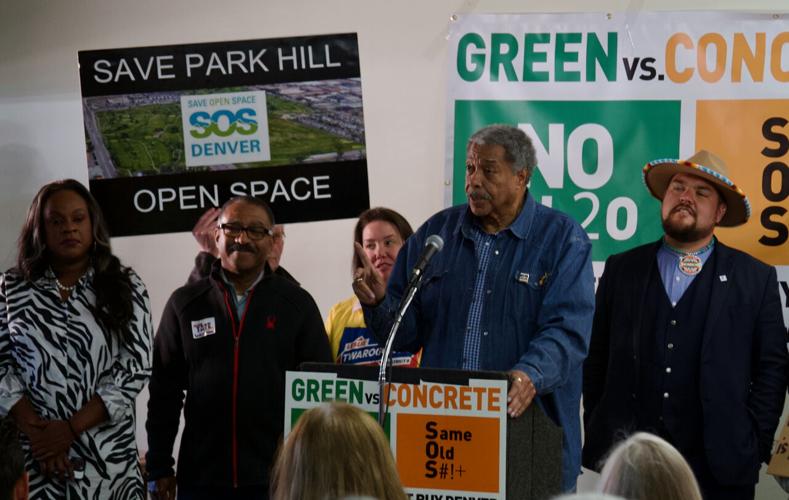A rally against the proposed redevelopment of the Park Hill Golf Course attracted hundreds in Denver on Sunday, including former mayor Wellington Webb, who sought to portray the fight as a battle between those who have the financial means to push it — and gain from its completion — and advocates for preserving it as open space.
It's likely only the first of several campaign rallies for or against Question 2O, which asks Denverites whether to remove a conservation easement at the Park Hill Golf Course.
A "yes" vote would allow a major redevelopment that includes affordable housing, market-rate apartments, retail — notably a grocery store — and park space. A "no" vote keeps the park under the conservation easement.
Critics say residents risk losing 155 acres of open space, while supporters argue it has the opportunity to offer a lot more, notably housing, at a time when the city struggles to increase its affordable inventory.
"What makes us different is we don't have a financial gain to get out of this," Webb told the crowd that gathered at Brother Jeff's Cultural Center. "They would never dream about doing this in Washington Park, Berkeley or Bear Valley. They figure we ain't got enough power to stop anything, but we're going to show them that's not the case."
The current easement requires an 18-hole golf course be maintained but allows golf-adjacent activities, such as tennis courts, a restaurant and a bar.
Councilwoman Candi CdeBaca of District 9, a vocal opponent of the redevelopment, worries it would price out future residents. District 9 sits on the western border of the Park Hill Golf Course.
The agreement the city council approved in January legally binds and creates several requirements for Westside Investment Partners, which owns the 155-acre plot of land and submitted redevelopment plans to Denver, or any future landowner.
The development plan must keep a quarter of available units under income restriction and mixed between for-sale and for-rent options. The for-sale units must be available to households making 120% of the area mean income (AMI) or less, while rental units must be restricted to those making 80% of the area mean income.
"When you make 90% (of the units) unaffordable in the same development, you're driving in a higher income earner, thus changing the area's median income for the following year," CdeBaca said. "So, for every AMI based unit, their allowable rents jump up with the AMI increase from year to year."
CdeBaca said she fears residents in the affordable units won't be able to absorb even a 10% increase in AMI, and its effects may cascade within five years, resulting in a neighborhood only accessible to people making six figures.
Supporters say the project presents one of the best opportunities for the city to increase its affordable housing inventory. At a recent debate on Question 2O, Westside Investment Partners principal Kenneth Ho said the city has fewer than 2,000 income-restricted units. The new community, Ho said, would increase that supply by more than 15%.
The 100 acres of park space to be set aside under Question 20, which would function as a water detention area as needed, would make the space Denver's fourth largest park. Plans also feature a multi-use trail connecting the redevelopment to the 40th and Colorado Station, Clayton and Park Hill.
Habitat for Humanity Metro Denver CEO Heather Lafferty, whose group supports the project, said, "Repurposing a defunct golf course into an actual community asset where people can afford to live should be everyone’s priority.”
Habitat for Humanity is among 30 organizations backing the proposal. Others include the Butterfly Pavilion, Denver Streets Partnership and the Denver Metro Chamber of Commerce.
"Measure 2O honors the important balance we need between protecting and activating open spaces and parks while also providing affordable and attainable housing, access to fresh and healthy food, and new opportunities for economic empowerment for residents,” J.J. Ament, president and CEO of the chamber, said in a news release.
Penfield Tate, a former state senator now running for one of Denver's two at-large council seats, opposes the project. He acknowledged the city faces an affordable housing crisis — but one in which the answer is not Park Hill's redevelopment.
"We've got to be creative, but we have to be strategic about the partnerships we build," he said. "There are a number of affordable housing developments right now on the drawing board ... in northeast Denver around the golf course site ... Once we lose this open space, it's gone forever."







